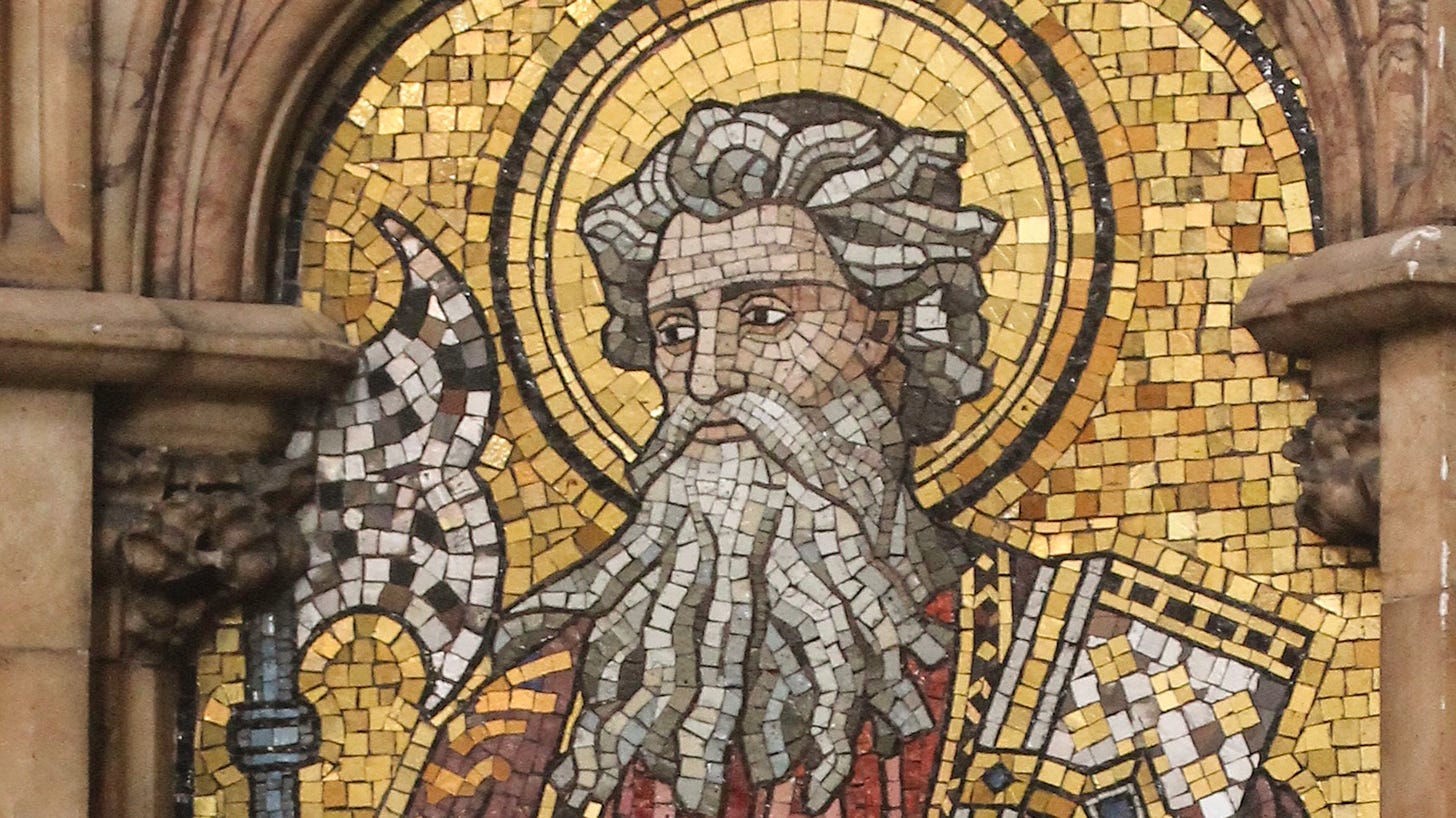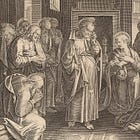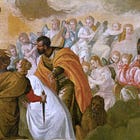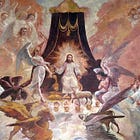St Matthias, his election and Our Lady – Fr H.J. Coleridge SJ
How did the Blessed Virgin Mary feel when St Matthias was elected as an Apostle to fill the place left by Judas?

Editors’ Notes
We were delighted recently to find finally an online edition of Fr Henry James Coleridge SJ’s Mother of the Church – Mary During the First Apostolic Age. This is the second part of his chapter on Our Lady and the Apostles in the time between the Ascension and Pentecost.
St Matthias (or Mathias) is somewhat in the background, not having been one of the original Twelve. As Coleridge says, we will not hear his name again in Scripture, after his election to the Apostolate.
But we do know from Acts, that when St Peter announced the need to replace Judas in front of a group of about 120 brethren, he gave certain criteria. We can learn a few things about St Matthias from these criteria:
“Wherefore of these men who have companied with us, all the time that the Lord Jesus came in and went out among us, beginning from the baptism of John, until the day wherein he was taken up from us, one of these must be made a witness with us of his resurrection.” (Acts 1.21-2)
This section deals with the election of St Matthias in the days leading up to Pentecost, considering what it meant to fill the place of Judas Iscariot, as well as Our Lady’s special care for the Apostles.
St Matthias – Pray for us!
From
Mother of the Church – Mary in the First Apostolic Age
Fr Henry James Coleridge
1887
MARY IN THE CENACLE
The Election of St Matthias
We are not told at what, particular time the retreat, as we should say, of the holy company in the Cenacle was interrupted for the purpose of the election of an Apostle in the place of the poor traitor Judas.
It can hardly be doubted that St. Peter and the rest must have received some instruction from our Lord on this subject. For it would have been perfectly easy for Him to have nominated a successor to the lost Apostle if that had been His will, and the person so chosen might have seemed to be endowed with greater authority if he had come before the world as the choice of our Lord Himself.
There may have been many Divine reasons for this counsel of God, whereby the twelfth witness of the Resurrection was to be chosen by the Church herself.
It gave an opportunity for the exercise of her sovereign power in such arrangements, and it also gave an opportunity to St. Peter for the first exercise of the primacy with which He had been solemnly invested on the shore of the Lake of Tiberias.
Answering to this exercise of authority, on the part of St. Peter, was the ready and most unquestioning acquiescence of the rest of the Apostles and of the infant Church in that exercise. Perhaps also it was well to set before the faithful this method of election as one which might be considered in itself the most regular and normal in the filling up of posts of authority and importance, although other ways were to be adopted under particular circumstances and when the mode of proceeding by election was comparatively inexpedient, or was impossible.
The occasion was grave, because it set before the minds of the Apostles and of the faithful that one of the most highly favoured of their own body, one who had shared the commission to preach and to work miracles in the Name of our Lord, as well as the other more intimate privileges of the Apostolate, had fallen away, through yielding to a very common temptation, and had been led by the fiend who had triumphed over his loyalty to our Lord, to a crime in itself most shameful, and involving an issue no less terrible than that of the murder of his Master.
The fall of Judas was not to them a provocation to anger and hatred against the poor traitor, so much as a solemn warning reminding them of their own great weakness, and it seems to be in this spirit that St. Peter and the historian of the incident, St. Luke, dwell upon the crime and its punishment. ‘‘Judas hath by transgression fallen, that he might go to his own place.”
How the election was determined
The choice of the humble St. Mathias is sometimes thought to have been determined, as far as it was determined by the faithful themselves, by the consideration that Joseph (or Barsabas), the other person put, as we should say, in nomination, was a very near relation to our Lord, having already one if not two brothers among the Apostles.
If this was the case, the election was a sort of protest by anticipation against the influence of considerations of birth or connections and the like, in the selection of the high ministers of the Church. For it cannot certainly be thought that Barsabas, whose name afterwards occurs in the sacred history as that of a distinguished saint, could have been unfit for the great office for which he seems to have been the first to be named.
If we consider what may have been the part of the Blessed Mother of our Lord on this occasion, we can find no better answer than that it must have been to her a matter of the most fervent prayer. She represented in the early Church, as during the life of our Lord, the thousands of holy and retired souls who were to be in all ages of the Church the silent mainstays of the work to be carried on by her active and authoritative ministers, whose prayers were to help the Pontiffs on their thrones, the bishops in their sees, the clergy and the missionaries all over the world, to furnish grace and light to the doctors and teachers and controversialists, to nerve the courage of the martyrs, the constancy of the confessors, and guard the purity of the virgins consecrated to God.
All these holy souls, whether collected in communities under religious vows, or serving God in their own homes, in the solitude of the desert, or the hermitage, are in a most true sense the children of Mary in this her own particular work of self-sacrifice, immolation, and intercession.
The special times and seasons which the Church sets apart for prayer and fasting for the ministers whom her pastors ordain from time to time, are repetitions of this holy period of prayer passed in the Cenacle, in which Mary was the centre around which the whole Church was then gathered.
Mary’s care for St Matthias
It is in harmony with these considerations that we should think of the new member of the Apostolical body as the object of the special care and solicitude of the Blessed Mother.
She had prayed long and with intense earnestness for the poor outcast Judas, and had grieved over the triumph of Satan in his case with a depth of sorrow exceeded only by that of the Sacred Heart of her Son. To her Mathias came in the place of Judas, like a new child granted to a mother who had lost one on whom she had spent care and love in vain.
The ministers of the Church, and especially all that are in any position of prominence and exceptionally high authority, must always be the objects of fervent intercession to such hearts as hers. But for St. Mathias she must have felt a special anxiety and tenderness, founded, not on any features in his character which might cause apprehension, but on the simple history of the soul in whose place he was now called to bear witness to the Resurrection of our Lord.
His name is never mentioned again in the sacred history, but he is said to have preached in Ethiopia and Arabia, and latterly in Palestine itself, where he laid down his life for the faith. The Church reads on his festival the beautiful words of our Lord, in which He gave thanks to His Father that He had hid the mysteries of the Gospel from the wise and prudent, and had revealed them to little ones.
We may gather from this that his characteristic grace was humility – the one grace which can secure the hearts in which it dwells from falls like that of Judas.
St Matthias – Pray for us!
Further Reading
The WM Review Coleridge Archive
The Mother of the Church: Mary During the First Apostolic Age – Fr Henry James Coleridge SJ
HELP KEEP THE WM REVIEW ONLINE!
As we expand The WM Review we would like to keep providing free articles for everyone. If you have benefitted from our content please do consider supporting us financially.
A subscription from you helps ensure that we can keep writing and sharing free material for all.
Plus, you will get access to our exclusive members-only material!
Thank you!







